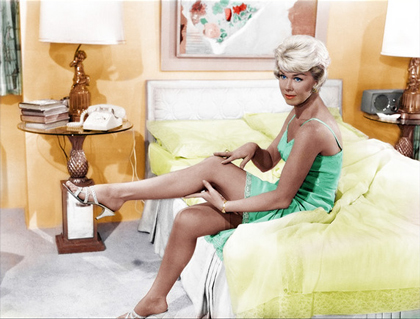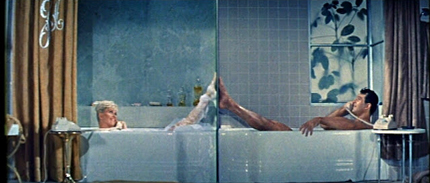
 |
|
|
|
This is it, the original template film for Doris Day and Rock Hudson, the original 'clean sex' team of the early 1960s. Their star chemistry changed the course of romantic comedy. Previous amorous pursuit epics almost always ended in marriage, with sex never part of the pre-nuptial deal. That hasn't changed in Pillow Talk, except that actually doing the deed is now considered a possibility. That was unthinkable a few years earlier, as witness the "shocking" controversy over the use of the word "virgin" in Otto Preminger's code-defying The Moon is Blue. The clever, Academy Award winning screenplay plays a brinksmanship job with good taste, employing chaste double-entendres and the racy knowledge that smiling, wholesome Doris would indeed hop in the sack for the right man under the right circumstances. The point of the farce seems to be about preserving Day's virginity long enough for the mistaken identities and amorous deceptions to play themselves out. 
Busy, successful interior decorator Jan Morrow (Doris Day) reports songwriter-lady killer Brad Allen (Rock Hudson) to the phone company because he selfishly hogs their party line. But the office sends a female investigator, which Brad seduces the same way he does every female. As revenge, Brad tries to seduce Jan in the guise of an aw-shucks Texan by the name of Rex Stetson. Jonathan Forbes (Tony Randall), an amorous client of Jan's, happens to be Brad's best friend and learns of the charade. Aiding and advising the love-struck Jan is her alcoholic housemaid Alma (Thelma Ritter). It is only a matter of time before Jan finds out that her Texan beau is really the despised Brad. It's hard to believe that New Yorkers still had to have party lines in 1959, or at least people living in slick high-rise apartments. In the helpful commentary to this disc this is explained when we learn that the original script was written seventeen years earlier. Pillow Talk uses the eavesdropping angle for its comedy hook. It dresses up Jan and Brad's phone conversations with split screens to create suggestive but censor-proof situations. Rock and Doris would never be allowed to share the same bathtub, but the matte line bisecting the screen allows them to sprawl in two tubs on opposite sides of the Panavision screen. They even play "footsie" with each other. The scene was considered risqué back then and is still too cute to be completely tame now. The film contains a high percentage of randy jokes and allusions, what with the eternally sexless Tony Randall failing to win Doris, even when he offers a bribe of a Mercedes convertible. Rock tells Randall a story about marriage being like a forest tree cut down and floated down the river with all the other logs, whereupon Randall protests that if he could marry Doris, he'd be happy to have his branches cut off. 
The sex politics also get pretty thick. It's presumed that wealthy single professional Doris is still a cripple until she has a man to call her own. As a comic example of female failure we're given Thelma Ritter in a two-joke role as a tippler with a problem riding elevators when hung over. When Doris finds a man she wants to marry, Thelma advises her to "get out of that (dressing) robe and rope him." On the other hand, Hudson lives the bachelor life in a Hugh Hefner pad with a switch that automatically locks doors, dims lights and cues the make-out music. A second switch pops a foldout bed out of a sofa. That's perfectly okay because literally every female Brad meets falls in a dead faint at his feet. Doris is armed with that rare magic quality that women desperately need in the movies, the ability to make goons like Hudson fall in love. The penultimate farce situation that recurred in later Day/Hudson romps is the road trip to the love-nest, wherein Rock draws an amorously aroused Doris out to some hideaway shack, usually under false pretenses. There'll be a big tease while Doris demonstrates that she's "ready" to, uh, you know, and then something happesn to interrupt at the last moment. Pillow Talk handles all these situations with deft ease, including the requisite Doris Day song, this time put across with style in a night club. Director Michael Gordon, or his designers, makes good use of the anamorphic screen, and the split screen party line scenes aren't overdone or tacky. There's an amusing sidebar story with a hot-to-trot Nick Adams as a Harvard man trying to assault Day in his MG sports car, and Marcel Dalio, Lee Patrick and Allan Jenkins provide memorable support. Important to mention are the single-swinger trappings that looked so attractive to young people in 1959. Living alone in modern apartments with maids, the principals haven't any family to fuss with. The female in particular has an enviable freedom. How many girls in 1959 could carry on an affair without everyone from their kid sister to the milkman finding out about it? Producer Ross Hunter knew the fantasies his feminine audience wanted to see. Miss Day's fashions are every bit as important to the movie as her acting. Pillow Talk plays a fine joke on Hollywood art direction when Doris wields her interior decorating skills to turn Hudson's pad into a bad taste nightmare that even terrifies a cat. Yet for the audience to be cued to the horror-look, a blast of music is necessary. Romantic comedy décor would become even more garish as the decade wore on, without the excuse of designer sabotage. Pillow Talk set the standard for mainstream Hollywood romantic comedies for the next ten years. 
Oscar-winning writer Russell Rouse earlier wrote D.O.A., wrote and directed The Thief and produced the docu oddity U.F.O.. But he also was connected to The Oscar, a monster embarrassment that cooked many a goose in tinsel town. Universal's 100th Anniversary Collector's Series Blu-ray + DVD of Pillow Talk has been given a lavish presentation beginning with a Herculean HD restoration that, I am told, brings back some very faded elements to near-pristine condition. The entire show is a vast improvement over the older DVD, for both picture and audio. The viewer gets both Blu-ray and standard DVD discs of the feature plus instructions for downloading the digital copy. The packaging is built into a thick book with some production notes but also a lot of script pages and international advertising art. Universal's extras include two featurettes. The first educates the viewer to the huge popularity of Pillow Talk and why such a relatively tame comedy was considered so racy. The real answer is that Hollywood's puritan Production Code had allowed foreign productions to far outpace us in portraying reality on screen. Pillow Talk is indeed charming, but it's also indicative of the barriers to honest filmmaking that existed in 1959. The second featurette examines the high-powered Doris Day - Rock Hudson starring combo, a double-whammy of wholesomeness that produced a string of cute, civilized and frustrated sex comedies. Hitting the subject -- the curious cultural hypocrisy of the times -- squarely on the head is the feature commentary with Jeff Bond and Twilight Time's Julie Kirgo and Nick Redman. Besides commenting on how important clothes and décor were to the female audience of the time, Ms. Kirgo has plenty to say about the way Ms. Day's character represents the dawning of liberation for professional women, at least in the arena of public discourse. There's also a discussion about the peculiar situation faced by Rock Hudson. The actor hid his personal life and played along with a fake marriage to keep his career on track. As one of his deceptions in the film, Hudson's Brad behaves in a conventionally gay manner. The situation is almost absurd: a gay actor is playing a straight man pretending to be gay. It's not far removed from Victor, Victoria. The easy-going Rock Hudson played a risky career game, and the fickle public at large was never the wiser.
On a scale of Excellent, Good, Fair, and Poor,
Pillow Talk Blu-ray rates:
Reviews on the Savant main site have additional credits information and are often updated and annotated with reader input and graphics. Also, don't forget the 2011 Savant Wish List. T'was Ever Thus.
Review Staff | About DVD Talk | Newsletter Subscribe | Join DVD Talk Forum |
| ||||||||||||||||||